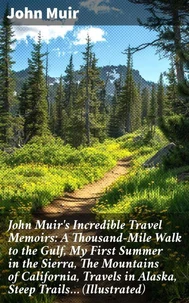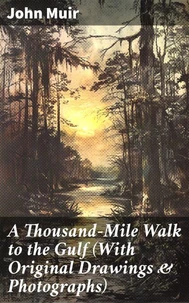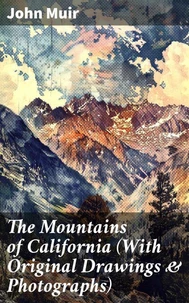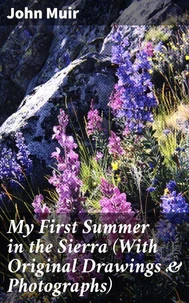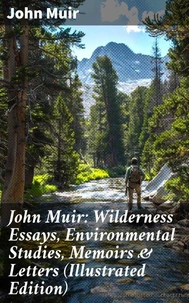The Wilderness Essays
Par :Formats :
Disponible dans votre compte client Decitre ou Furet du Nord dès validation de votre commande. Le format ePub est :
- Compatible avec une lecture sur My Vivlio (smartphone, tablette, ordinateur)
- Compatible avec une lecture sur liseuses Vivlio
- Pour les liseuses autres que Vivlio, vous devez utiliser le logiciel Adobe Digital Edition. Non compatible avec la lecture sur les liseuses Kindle, Remarkable et Sony
 , qui est-ce ?
, qui est-ce ?Notre partenaire de plateforme de lecture numérique où vous retrouverez l'ensemble de vos ebooks gratuitement
Pour en savoir plus sur nos ebooks, consultez notre aide en ligne ici
- Nombre de pages1966
- FormatePub
- ISBN859-65--4776684-1
- EAN8596547766841
- Date de parution28/12/2023
- Protection num.Digital Watermarking
- Taille11 Mo
- Infos supplémentairesepub
- ÉditeurDIGICAT
Résumé
In "The Wilderness Essays, " John Muir eloquently articulates his profound reverence for nature, weaving personal experience with philosophical reflection. This collection of essays, written in the late 19th century, encapsulates Muir's passionate advocacy for the preservation of the American wilderness, employing a lyrical and descriptive prose style that vividly captures the beauty and intricacies of the natural world.
Muir's writing is not only a reflection of the Romantic literary tradition but also acts as a significant precursor to the environmental movement, offering readers a lens through which to appreciate both the aesthetic and intrinsic value of unspoiled landscapes. John Muir, often referred to as the "Father of the National Parks, " was a Scottish-American naturalist whose childhood and early adulthood were steeped in the wonder of the natural world.
His experiences in the Sierra Nevada and other wild regions shaped his convictions about conservation and the urgent need to safeguard nature against industrialization. Muir's travels and observations inspired him to become a vocal advocate for establishing national parks, which informs the essays' call to action. "The Wilderness Essays" is an essential read for anyone interested in environmental literature, nature writing, or the historical context of conservation efforts in America.
Muir's insights resonate deeply today, urging readers to reconnect with the wilderness and consider their role in its ongoing preservation.
Muir's writing is not only a reflection of the Romantic literary tradition but also acts as a significant precursor to the environmental movement, offering readers a lens through which to appreciate both the aesthetic and intrinsic value of unspoiled landscapes. John Muir, often referred to as the "Father of the National Parks, " was a Scottish-American naturalist whose childhood and early adulthood were steeped in the wonder of the natural world.
His experiences in the Sierra Nevada and other wild regions shaped his convictions about conservation and the urgent need to safeguard nature against industrialization. Muir's travels and observations inspired him to become a vocal advocate for establishing national parks, which informs the essays' call to action. "The Wilderness Essays" is an essential read for anyone interested in environmental literature, nature writing, or the historical context of conservation efforts in America.
Muir's insights resonate deeply today, urging readers to reconnect with the wilderness and consider their role in its ongoing preservation.
In "The Wilderness Essays, " John Muir eloquently articulates his profound reverence for nature, weaving personal experience with philosophical reflection. This collection of essays, written in the late 19th century, encapsulates Muir's passionate advocacy for the preservation of the American wilderness, employing a lyrical and descriptive prose style that vividly captures the beauty and intricacies of the natural world.
Muir's writing is not only a reflection of the Romantic literary tradition but also acts as a significant precursor to the environmental movement, offering readers a lens through which to appreciate both the aesthetic and intrinsic value of unspoiled landscapes. John Muir, often referred to as the "Father of the National Parks, " was a Scottish-American naturalist whose childhood and early adulthood were steeped in the wonder of the natural world.
His experiences in the Sierra Nevada and other wild regions shaped his convictions about conservation and the urgent need to safeguard nature against industrialization. Muir's travels and observations inspired him to become a vocal advocate for establishing national parks, which informs the essays' call to action. "The Wilderness Essays" is an essential read for anyone interested in environmental literature, nature writing, or the historical context of conservation efforts in America.
Muir's insights resonate deeply today, urging readers to reconnect with the wilderness and consider their role in its ongoing preservation.
Muir's writing is not only a reflection of the Romantic literary tradition but also acts as a significant precursor to the environmental movement, offering readers a lens through which to appreciate both the aesthetic and intrinsic value of unspoiled landscapes. John Muir, often referred to as the "Father of the National Parks, " was a Scottish-American naturalist whose childhood and early adulthood were steeped in the wonder of the natural world.
His experiences in the Sierra Nevada and other wild regions shaped his convictions about conservation and the urgent need to safeguard nature against industrialization. Muir's travels and observations inspired him to become a vocal advocate for establishing national parks, which informs the essays' call to action. "The Wilderness Essays" is an essential read for anyone interested in environmental literature, nature writing, or the historical context of conservation efforts in America.
Muir's insights resonate deeply today, urging readers to reconnect with the wilderness and consider their role in its ongoing preservation.


